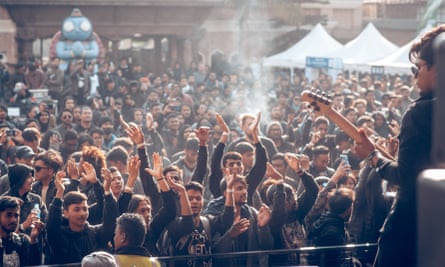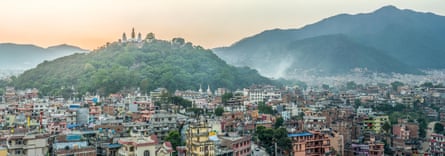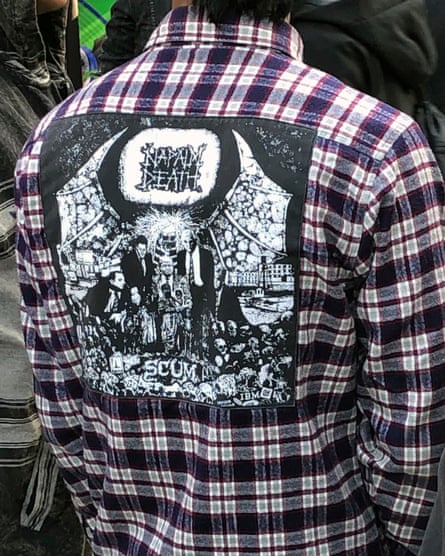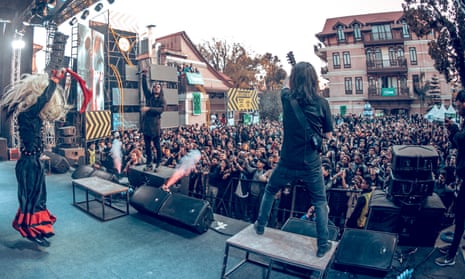When Ugra Karma made the first-ever Nepali metal recording, they didn’t intend to start a subculture. They just wanted to make life easier for themselves. “When we started to do shows,” says guitarist Prateek Raj Neupane, “our playing skills were at an amateur level. And the instruments we had were amateurish. And the sound didn’t come out good. We couldn’t explain what we wanted to sound engineers at shows, so we thought maybe we should do a record and give it to them so they could fix our sound. And that’s how we ended up recording the first-ever metal record in Nepal.”
That was in 2000 and the recording – the magnificently titled demo Himalayan Metal of Death, featuring a song called Perversion or Cutting Up of a Human Body & Eating Some of It – wasn’t made for general release. “We were thinking about bringing out three copies only, for the three people who recorded it. We would lend one to sound engineers at gigs. But our friends were adamant on us at least making 100 copies. We brought one of our friends’ father’s office printers to my home, made our own design and printed it.” The Nepali metal underground was born.
Back then, it was so underground that Ugra Karma, who were without a drummer, couldn’t even explain what death metal was to whoever filled in on the drum stool. “We would ask, ‘Do you play double bass drums?’” That’s the high-speed pummelling that powers death metal along. “They would tell us something like that didn’t even exist. So we switched instruments between songs. In one, I would do guitar and vocals, my friend would do bass, the other would do drums. But because we are not real drummers, we would get tired, so then I would go to drums and the other one would go to guitars. And then switch again.”

In truth, all metal in Nepal is still underground. This is one of the world’s poorest countries – ranked in the bottom quarter in the world for GDP per capita – and subject to political instability. The country was still recovering from a 10-year civil war that ended in 2006 when it was devastated by an earthquake in 2015. Corruption is endemic and the combination of denim, leather and long hair is still viewed with suspicion. Its music industry hasn’t the slightest interest in metal, which means everything has to be DIY.
For years, the police would pick up metal fans and cut off their long hair. Everyone mentions this as if it were a perfectly everyday thing. While that has stopped, the metal community still doesn’t have it easy: being a metalhead requires a level of commitment unknown in the west. “Recently, I was in jail for 15 days for putting on a thrash fest,” says Vishal Rai, who founded the Extreme Underground Metal Society of Nepal, which organises shows in the country. “Cops arrived in a van and said, ‘What kind of a noise is this?’ They took me in and charged me under noise pollution. I was kept inside for 15 days. This was a few months back. I am still on parole.”
This is the world in which the eighth edition of Silence festival exists. Nepal’s biggest metal event, established by Bikrant Shestra of the band Underside, is tiny by western standards: it takes place in two courtyards of a small hotel and restaurant complex in Kathmandu. But for Nepali metal, to have 1,500 or so fans in one place to watch a succession of bands across two stages one Saturday in mid-December is huge.

There are local groups – the excellent stoner rock trio Shree 3; Born in Silence, who owe such a debt (visually and sonically) to one particular band that they might as well be called KnotSlip; grindcore band Chepang, who have three singers, two drummers and no bassist; Prateek’s other death metal band, Binaash; and Underside themselves. There are bands from around Asia. And there is a big-name headliner: Californian thrash veterans Testament.
The day before Silence, though, there’s a sense of nervousness. It has been raining hard in Kathmandu, which means the site isn’t ready. Driving round the city, the surrounding mountains hidden from view by the lowering clouds and the traffic jostling on rutted and puddled roads, it’s hard to imagine how anyone could make a festival work here. And, as Underside’s singer Avishek KC explains, Nepal has a pay-on-the-day culture, and if the rain stays, the fans won’t come. What’s more, Testament’s fee alone accounts for more than the ticket revenue a sold-out event will bring, a situation made more worrying by the fact that one of the biggest sponsors has halved its funding. Worse still, Underside – the most popular metal band in Nepal – can’t even play their own festival: their drummer lives in Assam, in India, and can’t leave his girlfriend’s home because of the civil unrest there. There is gunfire outside the house and flights have been suspended.
Silence is clearly not going to make its organisers rich. Festival director Flower KC, who also manages Underside, reckons this one will lose £25,000, all covered by him and his friends. “The idea is guided by the idea that why should it be only mountaineers or hippies who come to Nepal?” Flower says. “Why can’t we attract a different breed of people? My goal is to make Nepal a heavy metal destination. Testament came to play purely because it was in Kathmandu – I hung out with them and they were stoked to be here.

“Fast forward 10 to 15 years, my dream is that our festival makes music fans want to travel to Nepal to see the sickest bands.” But he needs international sponsorship. “We don’t have infinite money, and sponsorship games are pretty weird in this country.”
While the people who run the festival might be middle-class by Nepali standards, they are not in western terms – all the Nepali metal musicians have other jobs. Prateek plays guitar in two bands, teaches leadership to management students in college, and acts in Nepali movies; Flower, who lives in the UK, works in local government in London.
Money matters here. “If you want to see real Nepal, you have to step out of the city,” Avishek says. “And people in the villages – until two years ago, you had all these power cut-offs, 18 hours a day without power. So people didn’t even have a choice to listen to music.” Prateek adds: “Working class here means something very different from England. They are so busy trying to get food and shelter for today that they do not have the luxury to come to gigs and listen to music and, in their terms, waste time.”
Being middle class, and having other avenues open to them, few metal bands last long – and fans don’t tend to stick with the scene far into their 20s. “They will regularly follow metal up to college,” says Vishal Rai. “But after college, they will get pressure from society and family to find a job. After college, they mostly follow a different lifestyle. But there are a few people who always stick to metal, like me. I’m very old to be into this stuff – I am 35.”
Having such a young scene is healthy in some ways, Prateek says. There are always young bands and fresh fans coming along. But because the scene is so young, no one has their own money, which means ticket prices have stayed low for 20 years, making it impossible for bands to even cover their costs.
“Make the tickets expensive,” he says. “Forget that 100 rupee [£1] bullshit. Make it 1,000. People need to learn that gigs are expensive. And there is a reason for that. If you hire a sound system, it will cost you. The venue will charge you. The venue gets paid, the sound system gets paid. But the bands – who are the core of the show, who the people come to see – aren’t paid.” Avishek notes that Underside, who can draw 800 people in Kathmandu, charged an unprecedented price for their last headline show: 500 rupees. A fiver, in British money.
Despite overnight storms, Saturday dawns clear. In the early morning, women are at the city’s wells, taking advantage of the good weather to get their washing done. Worshippers are making their clockwise walks around the roadside shrines that dot the city. And at the festival site, volunteers, having been unable to work the previous day, frantically pull everything together. Silence kicks off just a few minutes late and the crowd swells as the afternoon wears on. The majority of fans are local, with a few Europeans and Americans. One Peace Corps worker, who has come in from out of town, is sporting a T-shirt from the recent Extreme Gore Fest III event. When he went in the pit there, he says, everyone fled because he was twice their height and they thought he’d crush them.
The whole thing is fabulous: supremely good-natured and cooperative. There are local oddities: instead of the battle jackets – sleeveless denim covered with patches beloved of western metalheads – a fair few of the fans have sewn a big patch on to the back of a piece of entirely unmetal clothing. I see a Napalm Death patch on the back of a plaid shirt, though I’m not sure the lad who has attached a Pantera patch to the back of his waterproof has done its weather-resistant qualities any good. Best of all, Underside get their moment of glory after all. On learning of their drummer-less state, Testament’s Gene Hoglan – a legend in thrash metal – volunteers to spend the afternoon learning four songs so they can play a short set. Avishek is almost shaking with excitement when he tells me. “Gene Hoglan is going to play with Underside! Gene fucking Hoglan!”
After night falls, Testament take to the stage, the biggest metal band ever to have come to Nepal. Their singer, Chuck Billy, surveys the crowd. He’s played to thousands of audiences, most bigger than this, but I’ve rarely seen a man look so delighted to be fronting a band. “How are you fucking doing?” he shouts, then pauses to laugh. “Kathmandu?” And he shakes his head in disbelief.

Comments (…)
Sign in or create your Guardian account to join the discussion